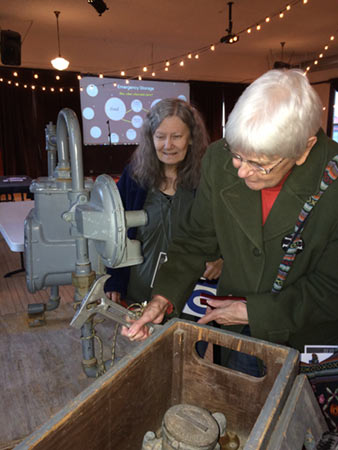By Nancy Varekamp | CNews Editor

“When you have something that’s unregulated and there’s tons of fear, there are all sorts of placebos,” said Tim Cook, NW Seismic structural consultant.
He told participants at the recent, local Neighborhood Emergency Preparedness Expo to be careful about making – or hiring – residential seismic retrofits. F
ollowing the event, Tim explained there’s no code for installing anchors to hold an existing home to its foundation during an earthquake. New home construction codes offer some reference for builders. And forensic engineering studies of homes damaged by earthquakes offer evidence-based criteria for optimum retrofit methods.
“It’s not rocket science, of course, but there are a lot of nuances,” he reported. Tim has been involved in the retrofit industry for six years, now working for a company that traces its roots to the Spring Break Quake in the 1990s.
“There’s no education required to do seismic reinforcement. We see a lot of engineering that people are paying for that isn’t going to work,” he said.
A survey in the San Francisco Bay area – ground zero in terms of industry knowledge – found 80 percent of the residential retrofits inspected probably won’t be effective.
“In this way, this is really embarrassing to the industry,” Tim noted.
Websites can provide both good and bad information. Tim pointed to the site maintained by the city of Salem Building & Safety Division. It recommends hardware designed to resist uplift forces generated by wind, rather than the lateral forces generated by earthquakes.
“If city inspectors don’t understand this, why would contractors go out of their way to learn the basics?” Tim asked.
He has these suggestions for DIYers and/or those who plan to hire contractors:
- Research contractors’ websites for information on their experience, methods and recommendations. Take note if they provide simple statements about earthquakes and nothing about how all the components fit together.
- Research Tim’s company website at NWSeismic.com to learn the basics about retrofitting.
- Attend a free workshop. Multnomah County Library invited NW Seismic to present them. The workshops are geared to homeowners – some of whom are DIYers and some who just want to be informed consumers. For details, visit MultCoLib.org/events/seismicretrofitting.
“Just keep digging deep and asking questions until you’re comfortable to make decisions,” Tim advised. “Above all, remember this business is fussy enough,” he added. “We recommend contractors do only seismic. If they do insulation, they shouldn’t do seismic. It’s not a recipe for success.”
Nancy Varekamp is semiretired from her career in journalism, public relations and – her favorite work engagement – writing and editing targeted newsletters